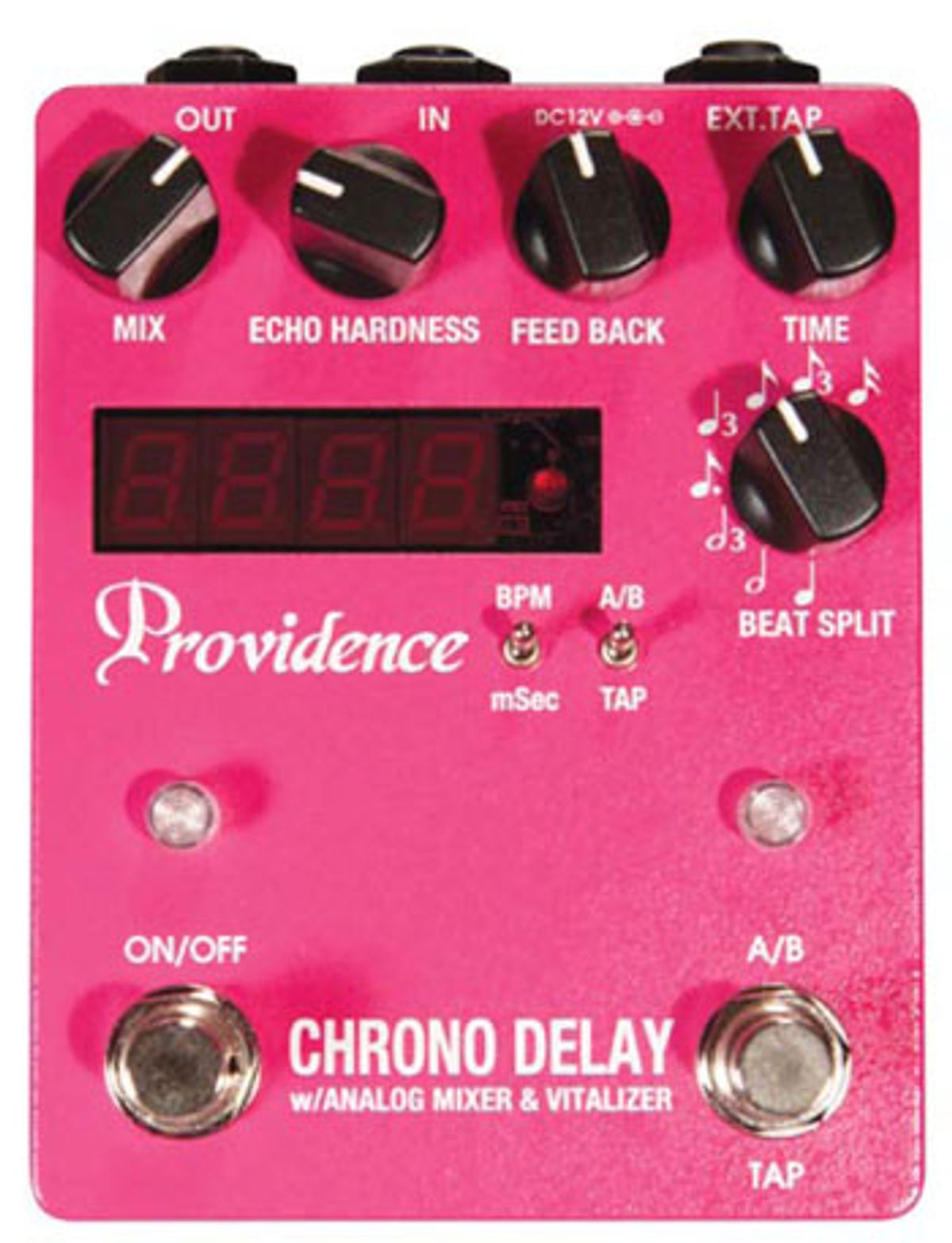
Chrono Delay DLY-4 replaces their cult-classic DLY-83, but also adds many significant upgrades that enable you tailor a very vintage analog delay sound with superb modern control and fine-tuning capabilities.
While its products are well regarded by
pro players like Carl Verheyen and
Jon Herrington, Japan-based Providence is
still relatively unknown in the States. I first
heard about the company through Matt
Schofield, who touted its SOV-2 as the best
overdrive he’d ever come across.
Since 2009, however, Providence has been distributed by Godlyke—a partnership that’s likely to elevate the brand’s visibility significantly. Providence is also bound to benefit from superb pedals like the Chrono Delay DLY-4, which replaces their cult-classic DLY-83, but also adds many significant upgrades that enable you tailor a very vintage analog delay sound with superb modern control and fine-tuning capabilities.
Feature Packed
The DLY-4 crams a lot of control into a relatively small pedal. In addition to the usual controls—Mix, Feedback, and Time (from 1 to 2700 ms)—there are knobs for Echo Hardness, which lets you adjust the delayed signal’s mids and highs, and Beat Split, which lets you choose the rhythmic subdivision of the repeats. There’s an LED readout in the middle of the pedal that displays the delay time, and just under the lights are two toggle switches that let you choose between having the delay time represented as beats-per-minute or milliseconds and selecting either A/B or Tap tempo modes. At the bottom of the pedal are two footswitches—On/Off and A/B or Tap. A slim, power-strip-friendly 12-volt DC wall wart is included.
Robust Repeats
I tested the DLY-4 using a Gibson ES-339 and a Mesa/Boogie Tremoverb—running the delay both in front of the amp and through its effects loop. In either setting the pedal is quiet and rich sounding.
Sustained bends with long delay and tripped-out, Edge-style rhythmic shenanigans, were both lush and extremely warm and clear. A twist of the Echo Hardness knob, sharpened the repeats making them more defined and almost percussive. It’s a little like being able to move between the qualities of a tape delay setting to a digital sound with the turn of a single knob.
The beats-per-minute time display option is a major convenience. Right off the bat, I was able to sync delays in time without having to convert ms to bpms, pull out a timing chart, or tap in a tempo in hope that it registered correctly. Once I set a tempo, the Beat Split knob made it a breeze to get the exact rhythmic subdivisions I wanted from the repeats. For example, if you want both quarter-note and eighth-note repeats at 120 bpm, you could leave the Beat Split set for quarternotes and save delay times of 120 and 240 bpm, which will sound like eighth-notes at 120 bpm. Flicking two knobs is much easier than calculating, say, how many ms are needed to generate 16ths at 100 bpm. And the more precise subdivisions can be quite effective when used in conjunction with the harder and more percussive Echo hardness settings.
The A/B preset memory allows you to store and recall two different delay time settings—great for moving from slapback to a long delay during a single song, for instance. Parameters like Beat Split or Feedback cannot be stored so you’ll have to have some familiarity with how to best set them for a given delay time to retain the super-precise subdivision settings that are such a strong suit of the Chrono Delay.
The Verdict
For most players, analog delays are the standard for sonic quality—even if it means trading precision for ballpark delay time settings. The DLY-4 pulls off the considerable warmth of the classics, but also allows precise and easy control of delay times. And although it carries a hefty street price of $449, and lacks stereo output or fancy features like modulation, if optimum delay time control and analog sounds are what you need in a pedal, the Providence Chrono is hard to top.
Since 2009, however, Providence has been distributed by Godlyke—a partnership that’s likely to elevate the brand’s visibility significantly. Providence is also bound to benefit from superb pedals like the Chrono Delay DLY-4, which replaces their cult-classic DLY-83, but also adds many significant upgrades that enable you tailor a very vintage analog delay sound with superb modern control and fine-tuning capabilities.
Feature Packed
The DLY-4 crams a lot of control into a relatively small pedal. In addition to the usual controls—Mix, Feedback, and Time (from 1 to 2700 ms)—there are knobs for Echo Hardness, which lets you adjust the delayed signal’s mids and highs, and Beat Split, which lets you choose the rhythmic subdivision of the repeats. There’s an LED readout in the middle of the pedal that displays the delay time, and just under the lights are two toggle switches that let you choose between having the delay time represented as beats-per-minute or milliseconds and selecting either A/B or Tap tempo modes. At the bottom of the pedal are two footswitches—On/Off and A/B or Tap. A slim, power-strip-friendly 12-volt DC wall wart is included.
Robust Repeats
I tested the DLY-4 using a Gibson ES-339 and a Mesa/Boogie Tremoverb—running the delay both in front of the amp and through its effects loop. In either setting the pedal is quiet and rich sounding.
Sustained bends with long delay and tripped-out, Edge-style rhythmic shenanigans, were both lush and extremely warm and clear. A twist of the Echo Hardness knob, sharpened the repeats making them more defined and almost percussive. It’s a little like being able to move between the qualities of a tape delay setting to a digital sound with the turn of a single knob.
The beats-per-minute time display option is a major convenience. Right off the bat, I was able to sync delays in time without having to convert ms to bpms, pull out a timing chart, or tap in a tempo in hope that it registered correctly. Once I set a tempo, the Beat Split knob made it a breeze to get the exact rhythmic subdivisions I wanted from the repeats. For example, if you want both quarter-note and eighth-note repeats at 120 bpm, you could leave the Beat Split set for quarternotes and save delay times of 120 and 240 bpm, which will sound like eighth-notes at 120 bpm. Flicking two knobs is much easier than calculating, say, how many ms are needed to generate 16ths at 100 bpm. And the more precise subdivisions can be quite effective when used in conjunction with the harder and more percussive Echo hardness settings.
The A/B preset memory allows you to store and recall two different delay time settings—great for moving from slapback to a long delay during a single song, for instance. Parameters like Beat Split or Feedback cannot be stored so you’ll have to have some familiarity with how to best set them for a given delay time to retain the super-precise subdivision settings that are such a strong suit of the Chrono Delay.
The Verdict
For most players, analog delays are the standard for sonic quality—even if it means trading precision for ballpark delay time settings. The DLY-4 pulls off the considerable warmth of the classics, but also allows precise and easy control of delay times. And although it carries a hefty street price of $449, and lacks stereo output or fancy features like modulation, if optimum delay time control and analog sounds are what you need in a pedal, the Providence Chrono is hard to top.
Buy if...
you crave vintage sounds but need modern features.
Skip if...
you don’t mind imprecise delay times.
Rating...
Street $449 - Providence - providence.com |
| <<< Previous Review: Levana Mellow-D | Next Review: SolidGoldFX Surf Rider >>> |

